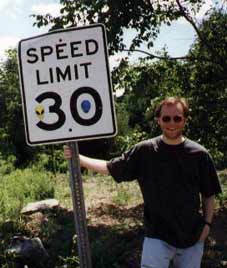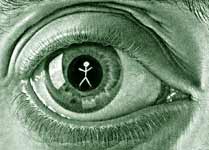
Scott Carr holds the distinction of being the most reasonable and intelligent Ufologist with whom I have ever come in contact. In a field where people sputter comments about inversions of the Cydonia region, transdimensional space conspiracies, and tungsten mining lemurs, Mr. Carr goes out of his way to examine the sociological reasoning behind a strange and persistent phenomena.
- What is the strangest thing you have seen so far?

Well, to begin I should tell you that I like to maintain a "healthy skepticism" regarding the paranormal. That is not to say that I don't believe or disbelieve in the existence of UFOs, ETs, Bigfoot, Ghosts, and other unexplained phenomenon. What it does mean is that I prefer to look at the available facts, cases, and sociology involved and try not to leap to any conclusions. In fact, my real area of focus I not on the phenomena at all, but rather the people involved with it---I study the sociology and subculture that has developed around the belief in the paranormal, specifically that of the Pine Bush skywatchers.
That said, I have seen my share of strange lights in and around the Pine Bush area: hovering over distant tree-lines, descending/ascending from far-of fields, moving unblinking across the night sky. Were those UFOs? To me, yes--with emphasis on the "U." to others who've seen them, they were "flying saucers," TLPs (transient light phenomenon), phantom craft, or extraterrestrial, inter-dimensional time machines.
That's the thing about the paranormal--or rather, those involved in it--many are all-too-willing to believe, and many are all to willing to see what they want to see, and use their imagination (or the group mythology of the subculture's combined imagination) to fill in the blanks.
Do I believe that there might be a spark of paranormal truth to the (Pine Bush) UFO phenomenon? Yes I do, but I also believe that that spark has ignited an inferno of cultural folklore and mythology.
- What do you think of the Ufology community?
The UFO community is a fascinating and eclectic bunch! It wouldn't be honest to say that they are the most coherent, well-grounded or scientifically oriented community out there, but they have their moments. To be fair, there are some wonderful scientists and sane folk in the UFO community. But I think that all will agree that the UFO field, more than any other, attracts its fair share of hangers-on and devotees, ranging from the mildly impressionable to the downright kooks.
It's this potpourri of culture that fascinates me more than anything else. there's nothing like heading out into the dark country fields of a hotspot only to find a dedicated skywatcher staring at the planet Venus and telling you conspiratorially that he's been "watching" that UFO I the same spot for *weeks*!
Or the multiple-PhD investigator researcher who confides that he telepathically communicates with ETs, believes himself to be to be the reincarnation of Christ, and was, in fact, imprisoned on the moon in a past life for "galactic" crimes...
Then there's the conspiracy theorist/Art Bell devotee who remains suspicious of the girls who world at "The Gap" over in the mall and s convinced of their New World Order connections, all because of those radio headsets that they wear while working in the store...
Are there legitimate, qualified researcher working in the field? You bet! (Only not so many as we'd like to think). But unfortunately the "researchers" (much like the "experiencers", "followers", and "devotees") come in many shapes and sizes. There are those who are in it for the money, for the publishing credits, to start a cult, to perpetrate a hoax---there are those who get caught up in the mythology, and those who, despite their professional positioning and academic credentials, are just as impressionable as many of those whom they seek to study.
I realize that I might sound as if I have a pessimistic view of the culture---but let me assure you that nothing is further from the truth. There ARE good, legitimate, intelligent, qualified and professional researchers and investigators out there and they shine like diamonds in a sea of fairy wisdom and sunbeams. But is that necessarily a *bad* thing? I don't think so. To my mind, the existence of such a diverse culture, replete with it's share of folklore, mythology, belief systems, fantasy, delusion and soap-opera sociology is infinitely more fascinating than the nuts-and-bolts of the 'lights in the sky' phenomenon. But why choose? Here we have BOTH: an intriguing and elusive phenomenon and a bizarre culture which has developed around it.
- Do you have any advice for amateur ufologists?
Yes. Don't believe everything that you read. Don't believe everything you hear. Don't believe everything you see. And don't trust any church that has a huge satellite dish perched on its roof.
One of the tenets that I have based my own "career" of UFO research (12+ years) on is that: "It is just as important to look at the researcher as it is to look at his research." I adamantly believe that when looking at the work of a researcher, it is just as important to understand his background, his beliefs and his motivations, and to take them into account when evaluating his work. It was just as important to know that Donald Schmitt was a postal worker as it was to understand that Kevin Randle is a retired Capt. U.S.A.F.R. It is important to understand that Betty and Barney Hill suffered emotionally from the weight of an interracial marriage, that Whitley Strieber was first a writer of horror/sci-fi, and so on. For both better and worse, it is important to know where someone involved in the UFO field is coming from, and it is impossible, impractical, and unethical to separate the research from the researcher.
When you read the work of an investigator with numerous PhDs, and that work (on the surface, at least) appears sound---what then happens when you later learn that that same researcher is also the leader of a cult and claims to be the "New Jesus." Is the legitimacy of the research now suspect? I believe that it is. All-too-often in the UFO field, the seemingly scientific work of researchers is tainted by their bizarre beliefs and delusions. Not to say that this is *always* the case, or that legitimate research can't be done despite bizarre or strong irrational beliefs (Einstein, after all, was a devout Christian) ---but it is something to definitely watch out for.
Don't take anything at face value. And, especially in this field, don't let yourself be intimidated by another investigator's credentials, publications, or experience. Use your head, and don't accept any conclusion, even if the person (especially if the person) pushing those conclusions comes off as a "pro."
E! Online recently hailed Scott Christian Carr's work, saying "True genius abounds here... Chris Carter, take heed!" Scott C. Carr is writer and journalist with an insatiable curiosity for modern folklore. He has appeared as an expert on both television and radio, including recently FOX News: FOX In Focus and the film documentary The Hudson Valley Sightings. In addition, he produced and co-hosted his own radio talk show UFO Desk on 99.5 FM WBAI, NY. He’s the Chief Editor of the critically acclaimed Apocalypse Fiction Magazine and the Writer and Executive Producer of the AFM/Blue Moon Movies film, The NUKE Brothers. He has written for Sony Entertainment, Artisan Films’ Distant Corners Entertainment Group, and his fiction and nonfiction have recently appeared in Pulp Eternity, The Dream People Literary Magazine, and the Double Dragon Publishing anthologies Of Flesh and Hunger, The Wicked Will Laugh, Demonology... Grammaticus Demonium, and Scary Holiday Tales to Make You Scream. A chapter from his novel Believer appears in Sick: An Anthology of Illness. Carr’s work has been favorably reviewed in both MovieLine and Heavy Metal: The Adult Illustrated Fantasy Magazine. In 1999, for his socio-paranormal news journal The Flying Saucer Gazette, he was awarded The Hunter S. Thompson Award for Outstanding Journalism.
His epic 4-novel series of superhero family dysfunction, Champion Mountain, is currently available from Double Dragon Publishing. He is the creator and writer of The Continuing Adventures of Fat Man and Little Boy which is published by Plastic Farm Press and will be in comic book stores everywhere in March, 2005.
Scott is currently hard at work researching and writing his nonfiction book, Junkyard Living, and his science fiction novel, Until the Stars Grow Dark.
